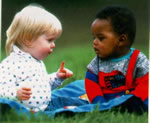Missing Persons Clearinghouse
1-800-346-3543
Educating Your Child - Basic Rules of Safety

As soon as children can articulate a sentence, they can begin the process of learning about personal safety. Each child should be taught:
- His or her name and address and how to write them.
- His or her home telephone number (including area code) and how to dial it.
- How to use 911.
Other things to teach your children...
If you are in a public place and become separated from your parent(s):
- Do not wander around looking for them.
- Quickly go to a trustworthy adult and tell the person that you have lost your parent(s) and need help in finding them.
- If you are in a building or other restricted access area (such as a store, shopping mall, or amusement park) go to a person at a checkout counter or a security officer.
- If in an unrestricted area (such as the street or a recreational park) go to a police officer, the entrance or reception area of a business where people are present, or a group of adults.
- Do not leave the building or area with anyone until your parents are found.

You should not get into a car or go anywhere with any person unless you have obtained permission from your parents or the adult responsible for you at that time.
If someone follows you on foot or in a car, run away to a safe place.
- A safe place is home, the home of a friend or neighbor, a store, etc; a place where there are people.
- A safe place is normally not a wooded area, a pile of leaves, an abandoned house, etc.
Children should learn to stay away from people in cars, vans or trucks.
- You don't need to go near the car to talk to the people inside.
- They should know that it is okay to say "NO" - even to an adult.
Adults who need help should not be asking children for help; they should be asking other adults.
- No one should be asking you for directions or to look for a lost pet.
- Even if a person wearing a uniform or in possession of a badge requests your assistance, you should tell your parents or other adult before helping or going with the person.
You should not go with a person who tells you that your mother or father is in trouble and that he will take you to them.
If someone tries to take you somewhere, quickly get away from them and yell or scream, "This man is trying to take me away" or "This person is not my father (or mother)."
- "Say No, Then Go and Tell".
- "Yell, Run and Tell".
Always ask your parent's permission, or the person in charge (e.g., teacher, babysitter) if you want to leave the yard or play area or to go into someone's home.
You should avoid empty lots, wooded areas, fields and parks when traveling from place to place; You should avoid playing in deserted areas.
You should try to use the "buddy system" and never go places alone. There is strength in numbers.

Do not answer the door when a parent is not home and never say that you are alone to someone on the telephone.
Never hitchhike or try to get a ride home with anyone, unless your parents have told you it is okay to ride with the person in advance.
No one should ask you to keep a "special" secret. If he or she does, tell "someone you trust."
If someone wants to take your picture, tell your parents or teacher before allowing the person to take the picture.
No one should touch you in the parts of your body covered by a bathing suit, nor should you touch anyone else in those areas.
- You can be assertive, and you have the right to say "No" to someone who tries to take you somewhere, touches you, or makes you feel uncomfortable in any way.
- Promptly tell a trusted adult if someone touches you or does anything else that makes you feel uncomfortable.
Never accept gifts offered by strangers without checking with your parents first.
If someone, even a friend, is in possession of a gun (even if not loaded) or other weapon; Immediately leave and tell an adult.
* * * * *

For parents.....You and your child need to be careful... but you do not need to live with fear.
- Strike a balance between avoiding the issue and instilling a sense of fear in your children.
- Instill a sense of caution.
Finally... set a good example with your own actions by consistently following established rules.
- For example, lock doors and windows and always see who's there before opening the door.